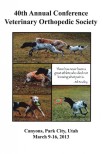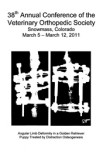Objective—To evaluate the effects of sequential anesthesia of the individual compartments of the equine stifle joint on lameness induced by intra-articular deposition of interleukin (IL)-1β.
Animals—6 horses.
Procedures—For each horse, baseline hind limb lameness was first evaluated. A randomly selected compartment of 1 stifle joint was then injected with IL-1β to induce synovitis and lameness; subsequently, the same compartment was anesthetized with 2% mepivacaine hydrochloride, and lameness was reevaluated. Two weeks later, baseline lameness was evaluated, and lameness was similarly induced; thereafter, the 2 synovial compartments of the stifle joint not injected with IL-1β were anesthetized sequentially in random order (ie, first and second blocks); lameness was evaluated after each block. Finally, the IL-1β–treated compartment was anesthetized (third block); lameness was again evaluated. This second experiment was repeated for the contralateral stifle joint 2 weeks later. Throughout the study, lameness was quantified objectively by assessing vertical pelvic movement asymmetry with a wireless, inertial sensor-based system.
Results—Intra-articular deposition of IL-1β induced lameness in all injected limbs. In the first experiment, anesthesia of the compartment injected with IL-1β resulted in a significant decrease in lameness, with vertical pelvic movement asymmetry approaching baseline. In the second experiment, lameness improved significantly after the second and third blocks and was almost completely abolished after all 3 synovial compartments were anesthetized.
Conclusions and Clinical Relevance—In horses, lameness caused by a lesion in 1 compartment of a stifle joint can be improved more by instillation of local anesthetic solution into that compartment than by anesthesia of the other compartments









